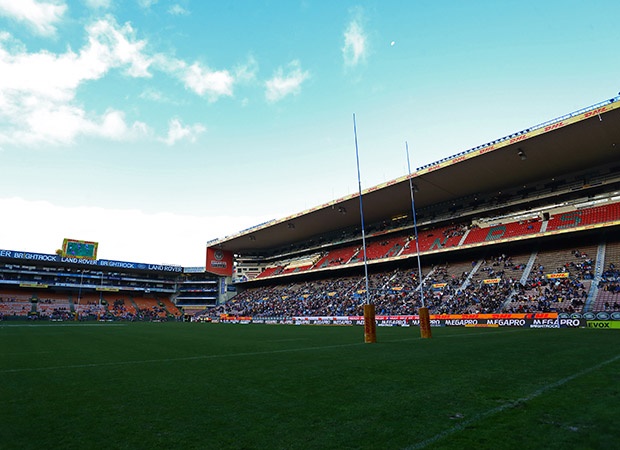


Newlands Rugby Stadium (Gallo)
- Sponsorship rights firm Aerios charge that SARU “unlawfully tried to rid itself” of them “for self-gain”.
- Damages of R183-million are sought against SARU and the WP Rugby Football Union.
- The much-publicised dispute between WP Rugby and Aerios wasfirst revealed on Sport24 in late 2016.
The agency which managed the advertising rights of the Western Province Rugby Football Union (WPRFU) from 2012, Aerios Pty (Ltd), says it has taken the South African Rugby Union (SARU) and WPRFU to court for damages amounting to R183-million after an extensive three-year inquiry into potential unlawful conduct.
Register your interest for the British & Irish Lions tickets in South Africa 2021
Aerios say that SARU are “at the centre” of the court action, following a long-running, much-publicised dispute between WP Rugby and Aerios first revealed on Sport24 in late 2016 and a contributor to a debilitating, broader financial meltdown at Newlands.
Both SA Rugby and WP Rugby have been approached for comment over the Aerios move on Wednesday.
In a media statement, Aerios said: “(We) believe SARU acted unlawfully in trying to rid itself of Aerios for self-gain.”
The umbrella body did so, Aerios maintains, by applying “undue pressure” on Western Province Rugby (Pty) Ltd (WPR) to release itself from advertising agreements dating from 2012.
Aerios chief executive Costas Constantinou says the papers describe the “undue pressure and abuse of power” SARU exerted over Western Province Rugby (Pty) Ltd (WPR) when it threatened to withhold a commercially important Test match allocation to Newlands.
“This WPR did expressly to extract itself from advertising agreements with Aerios.”
Aerios say they have instituted the court action on the basis of information gathered during the three-year inquiry, which was concluded at the end of 2019.
Based on its findings, it is suing SARU as the main respondent and also the WPRFU for R183 million in damages.
“These damages were suffered as a result of the loss of extensive agreements that gave Aerios the exclusive rights to sell Western Province advertising at Newlands and/or the Cape Town Stadium, if Western Province relocated or played fixtures there.
“The papers argue that WPR considered every available option – including obtaining multiple legal opinions – for ridding itself of Aerios and appeasing SARU.
“After enduring months of distress at the hands of SARU, WPR eventually took a decision to ‘release’ itself from the Aerios agreements by going into liquidation, on the ground that it was unable to pay its debts.
“Having taken this decision, it immediately informed Aerios that its advertising contracts with Aerios would not be honoured (in 2016).
“By entering into these contracts with WPR, Aerios had acquired the advertising rights for professional rugby played at the Newlands and/or Cape Town stadiums. These included the rights to all international fixtures during the period January 2012 to December 2023, secured in separate contracts signed in 2011 and 2014.”
Constantinou says: “SARU endorsed the liquidation of WPR. In doing so, it abused its effective monopoly over professional rugby and its position of authority over its members.
“In addition, it intentionally interfered with and forced WPR to end its contractual relationship between WPR and Aerios.”
In addition, Constantinou claims Aerios was granted the exclusive rights to create, develop, install and operate Wi-Fi and digital mobile content at Newlands rugby stadium.
Aerios was also allegedly awarded the exclusive rights, for a period of 20 years, to develop and operate the official WPR applications from which the digital content could be viewed by supporters.
“However, SARU purposely ignored the rights WPR had granted to Aerios. SARU instead concluded broadcasting and mobile digital agreements with SuperSport. In addition, it concluded agreements with SARU sponsors, who were awarded certain advertising rights at rugby matches hosted by SARU’s various provincial unions.
“This meant that SARU had granted SuperSport and SARU sponsors’ commercial rights that WPR had previously committed itself to contractually to Aerios. By acting in these ways, SARU was potentially in breach of its obligations to SuperSport, its sponsors and also to World Rugby.”
Aerios says it questions the validity of the broadcast rights granted to SuperSport and the various commercial rights that SARU maintained belonged to them, and claimed it could dispose of as it wished.
“These rights included advertising rights provided to Super Rugby and Currie Cup sponsors and for any international fixture, including the successful IRB Sevens held annually at Cape Town Stadium.”
Constantinou adds: “If they had been challenged at the time, these decisions would undoubtedly have put SARU on a collision course with its council member, WPRFU.
“We maintain that SARU abused its power and authority by continuously threatening WPRFU that it would not allocate lucrative Test matches … to the Newlands rugby stadium.”
*Follow our chief writer on Twitter: @RobHouwing

